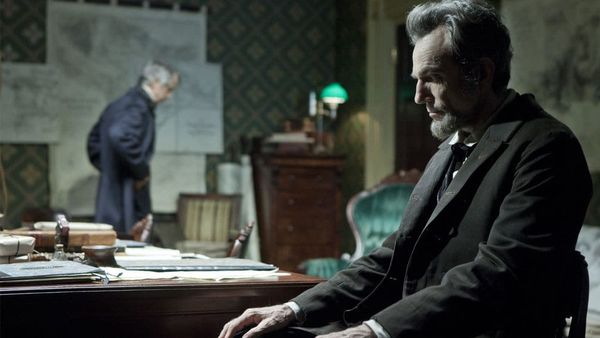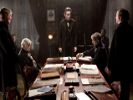Eye For Film >> Movies >> Lincoln (2012) Film Review
Lincoln
Reviewed by: Anne-Katrin Titze

In Lincoln, Spielberg starts off in hand to hand battles, fixed bayonets in the mud. Thunder and lightning set the tone before President Lincoln meets outspoken soldiers of the coloured Union infantry in a pouring rain and discusses the topics that will spring up. The appetizer exposition talks about the inequality in pay (black soldiers earn $3 less than white), the far away dream of the right to vote, and the professions available around the president - cutting hair and shining shoes, not being an option. It is already January 1865, the Civil War is entering its fourth year and everyone in the administration is getting anxious to end the conflict without defeat or compromise.
A dream sequence shows Lincoln's White House resembling a snow globe. Where is Rosebud? Lincoln is played with much sympathy and proximity by Daniel Day-Lewis as a president who touches things and people. The linear objective of the film, with a screenplay by Tony Kushner, based in part on historian Doris Kearns Goodwin's book Team of Rivals: The Political Genius of Abraham Lincoln, is clear: let's get the 13th amendment approved by the House and slavery abolished. Yet, there are many questions as to how. If peace talks end the war before the vote, will Congress want to hold on to slavery?

A convincingly troubled Secretary of State, William Seward (David Strathairn) juggles the goings on both inside the White House and on the battlefield. He is the president's closest confidant and acts as a ballast by playing devil's advocate. Mr and Mrs Jolly (Bill Camp and Elizabeth Marvel) are brought in to give the president a much needed dose of reality. A poll of two, with zero chance of inaccuracy.
A frustrated and tired Preston Blair (Hal Holbrook) is the powerbroker for the southern votes while a snarling Thaddeus Stevens (Tommy Lee Jones) represents the northern votes and the abolitionist movement.
Spielberg cannot resist adding an emotionally hungry little boy, too, as if to represent his childhood imagination. Here, it is the president's youngest son Tad (Gulliver McGrath), a tiny prince, who races in a little goat cart through the corridors of the White House (shot like a tricycling Danny Torrance in The Shining), supposedly sets war maps on fire, and loves to look at daguerreotypes of slave children. His father plays with him, lies with him on the floor, tousles his hair. Day-Lewis's performance reminded me of John Singer Sargent portraits because of the way he caresses, almost pets, those around him, which stands in stark contrast to the formality of attire and situation.
Spielberg, as he is very good at, goes out on a limb to walk a tightrope of his own making between melodrama and sinewy storytelling. It is at times too obvious how much the actors seriously enjoyed being part of the Civil War. The excitement is historical and their performances become cameos, as in jewelry, not film roles. The danger is for it to turn into a costumed cocktail party for actors.
Abraham Lincoln also likes to tell stories, to the point that some are sick of them. A quality portrayed as an endearment. He talks about Euclid and equality with two young message boys and continues to give the impression of a man disconnecting from the heavy burden of a civil war resting uncomfortably upon his sunken shoulders. The First Lady, played by Sally Field, and their eldest son Robert (Joseph Gordon-Levitt), who wants to go to war, are not so easy for the president to deal with. You get the message, he would much rather clean his boots with his valet. He does help Mrs Lincoln out of her corset, though. What is Spielberg doing here? He is so careful not to offend anybody. If you didn't know anything about the oppression and economic consequences of 19th century slavery in America, you would be left in the dark.
Miss Keckley (Gloria Reuben) Mary "Molly" Todd, Lincoln's silent confidante in the White House and constant companion, mentions to the president that she was beaten as a child when she was a slave. The bloodiest it gets is a wheelbarrow of freshly severed limbs with dripping blood crossing the path, right on cue, of the Lincolns' oldest son before he enlists and gets commissioned by his father to a plum position.
Weeks of back room wheeling and dealing to give the president plausible deniability are exposed. James Spader plays WN Bilbo, for all it's worth, one of three hired men to ensure votes for passage. He carves a wooden decoy and works hard on convincing the unconvinced, by dropping money in a bank or by hunting down cowardly US Representatives, such as Clay Hutchins, played by Walton Goggins, a far cry from his role of Billy Chase, in Tarantino's Django Unchained.
An outstanding Bill Raymond maintains a dignity as Schuyler Colfax, Speaker of the House of Representatives and reminds us all that "This isn't usual. This is history".
Lincoln had its premiere as the unannounced surprise film of the 2012 New York Film Festival. This is a movie with hardly a sliver of sky. It feels as though we were trapped in a box with these historical chess pieces. We crouch into history, as the camera cuts at the highest head in the frame, and leaves no headroom. In Lincoln's words, as dictated in a communication to General Ulysses S Grant (an excellent Jared Harris): "Can we choose to be born? Are we fitted to the times we are born into?"
We go to the theatre twice, none of the visits turn out to be what we expect. Lincoln is not the kind of movie that creates nostalgia for the good old days, good or bad.
Reviewed on: 29 Dec 2012


















